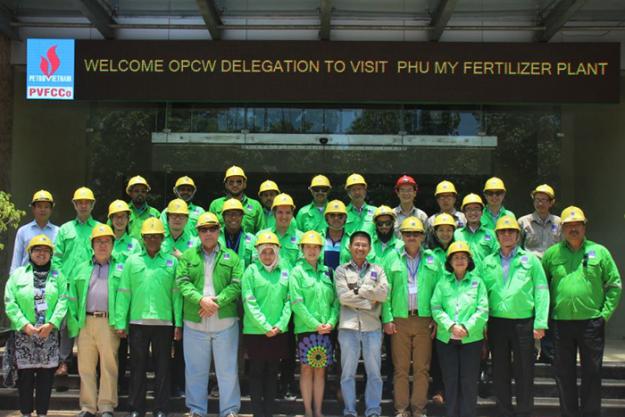
Participants at a workshop on needs assessment and best practices on chemical safety and security management in Ho Chi Minh City, Vietnam
THE HAGUE, Netherlands – 20 April 2018 – Experts from the Organisation for the Prohibition of Chemical Weapons (OPCW) Asian Member States shared their knowledge and fortified their skills in a Workshop on Needs Assessment and Best Practices on Chemical Safety and Security Management, held in Ho Chi Minh City, Vietnam from 10-12 April.
The workshop, organised by the OPCW and the Government of Vietnam, contributed towards the creation of a comprehensive inventory of OPCW Member States’ needs, tools, guidance and best practices related to chemical safety and security management.
The Director-General of Vietnam’s National Authority, Mr Nguyen Van Thanh, spoke about the importance of chemical safety and security management for Asian countries, and the need for an integrated approach. He highlighted that the workshop “provided a good platform for the Asian countries to share their experiences” and “will benefit experts who are developing chemical policy and chemical management in their countries”.
OPCW’s Head of International Cooperation Branch (ICB), Mrs Xiaohui Wu, underlined that the inventory will ultimately serve to advance OPCW’s overarching goal for chemistry to be used solely for peaceful purposes.
She also stated that the workshop is “part of a series on Needs Assessment and Best Practices, designed to better tailor OPCW’s capacity-building programmes to the needs of the State Parties”.
Participants examined various components of chemical safety and security management, including trends and challenges, threat assessments and mitigation measures, gaps in chemical safety and security management, and efforts to build safety and security culture along the chemical supply chain. Attendees also visited PetroVietnam Fertilizer and Chemicals Corporation to witness the practical application of chemical safety and security management procedures in Vietnam’s chemical industry.
The workshop was attended by over 30 participants from Bangladesh, Cambodia, China, Indonesia, Iran, Iraq, Republic of Korea, Malaysia, Maldives, Pakistan, Qatar, Saudi Arabia, Sri Lanka, Uzbekistan and Vietnam.
Background
As the implementing body for the Chemical Weapons Convention, the OPCW oversees the global endeavour to permanently and verifiably eliminate chemical weapons. Since the Convention’s entry into force in 1997 – and with its 192 States Parties – it is the most successful disarmament treaty eliminating an entire class of weapons of mass destruction.
Over 96 per cent of all chemical weapon stockpiles declared by possessor States have been destroyed under OPCW verification. For its extensive efforts in eliminating chemical weapons, the OPCW received the 2013 Nobel Prize for Peace.
